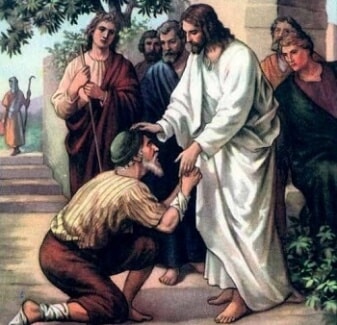
I sometimes wonder: How zealous am I supposed to be in turning to the Lord for help? Am I supposed to implore the aid of the Almighty at every turn? Or did He create me with a certain amount of autonomy to take care of myself? Are there some matters I’m just supposed to accept, without asking for intervention? Is it okay to ask halfheartedly, accepting the outcome if my prayers aren’t answered in the way I wanted?
This flood of thoughts came to mind as I considered today’s readings. I spent a lot of time looking in the cracks of the selection from the Gospel of Luke, which tells of some of the miraculous healing performed by Jesus:
“At sunset, all who had people sick with various diseases brought them to him. He laid his hands on each of them and cured them.” (Luke 4:40)
That certainly makes sense. But shortly thereafter, the story tells about what happened the next day:
“At daybreak, Jesus left and went to a deserted place. The crowds went looking for him, and when they came to him, they tried to prevent him from leaving them. But he said to them, “To the other towns also I must proclaim the good news of the Kingdom of God, because for this purpose I have been sent.” (Luke 4:42-43)
Unpacking that, we see that – in the first line – everyone had their illnesses cured. In the second line, though, Jesus was trying to slip away to go elsewhere, and the people were trying to stop him! We understand that Jesus had to go to other towns, but what can we read into his unwillingness to stay? Maybe you have your own ideas (which I’d welcome you to share), but here’s where my contemplation took me.
Maybe the Son of Man had better places to be. There are no instances in the Gospels where Jesus used his full divinity to satisfy every whim of those who encountered him. Maybe – being fully human – he was still limited in only being in one place at one time, and he knew that God’s plan required him to visit many places.
Maybe the people there didn’t “really” need him. We know from Luke 4:40 that everyone who had someone suffering from illness had their loved ones’ ailments cured. Perhaps Christ knew that – their most pressing needs resolved – it was a good time to depart and do the Father’s work elsewhere.
Maybe Jesus could sense their non-medical needs, but felt it did the Father’s will to have them remain unmet. Remember that Christ is not primarily concerned with comforts of this world; he is most concerned with the Kingdom of God and ensuring that everyone has the opportunity to hear the good news and prepare their hearts and minds for the coming Kingdom. Perhaps Jesus knows that many of us (and I would include myself) would have a harder time focusing on the life hereafter if I were experiencing an idyllic existence in this world.
Maybe Christ left their needs unmet because he expects us to do it. Jesus notes elsewhere how what we do for the least of each other we do for him (Matthew 25:40). Perhaps, at a certain point, we’re expected to take care of our own needs – or, more correctly, take care of each others’ needs – as a way of doing the will of God here on Earth. The Bible makes clear that love is an active thing (see, for example, the discussion of the unified nature of faith and works, from Chapter 2 of the Letter of James). By loving each other in a Christlike way, those early Christians were feeding, healing, and comforting each other, as Jesus did.
Maybe we just can’t know. While Christ was fully human, he was also God; our mortal minds cannot fathom why certain things happen or fail to happen in accordance with God’s plan. This was the entire point of the Book of Job, where terrible calamities befall the righteous Job for no reason he can discern.
Speaking solely for myself, I’ve long been easier with prayers of gratitude for the many blessings I have, rather than prayers for what I wished to have happen. When I do pray for the latter, it’s usually for others and with a vague, “I hope so-and-so feels better,” or “I hope such-and-such can find peace.” Outside of Simon’s mother-in-law (who “got up immediately and waited on them”), there’s no mention of gratitude from those healed in today’s Luke selection . . . just a mildly tense scene of the crowds looking to keep Jesus from leaving – wanting something else, something more. Perhaps I fear that if I could directly encounter Christ and have my earthly wishes granted, I would also want more – be drawn more closely to this fleeting world, away from the real goal of this life.
Or perhaps I’m doing it wrong; Christ teaches us time and time again that whatever you ask for in prayer with faith, you will receive. (Matthew 21:22, John 14:13-14, Mark 11:24). Perhaps I use my fear of being part of the crowd – trying to keep Jesus from leaving so he can do the Father’s will elsewhere – to keep my heart hard enough to even ask. I honestly don’t know.
But while I still try to work on this issue, I continue to love both my fellow Christians and those who’ve yet to come to know Christ. And, I do what I can to do for those in need, as I hope I would have served Christ himself were I fortunate enough to haven see him during his time here on Earth.
